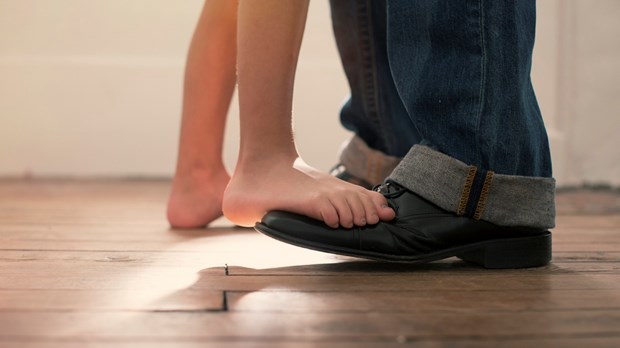Why One Dad Is Best

"God intended for children to be raised by their biological parents."
I'd been walking with a friend, during my early twenties, when he dropped this emotional bomb on me. Or maybe it's better to say that the pin to this particular grenade had been pulled in my heart decades earlier but that, in that moment, it exploded in my heart. Though my feet kept moving, the gears inside me ground to a halt. Shrapnel swirling, the brazen claim felt both like an assault to my identity and a blow to my theology.
"Ummm . . . what?" I asked, a bit stunned.
My friend knew that I'd been given up for adoption as an infant. And he also knew that I believed the positive story I had been told about my journey.
Throughout my childhood I'd been assured that my birth parents had relinquished me because they loved me. When my adoptive parents divorced when I was six, my new stepfather told me he loved me more than anyone else loved me. Desperate to believe that God had not failed me, and clinging to the hope that I was worth loving, I hadn't dared imagine that God might not have ordained my bumpy ride.
In childhood, when friends' jaws would drop after I detailed the colorful cavalcade of parents in my life—birth mom, birth father, adoptive mother, adoptive father, stepfather—I'd always assure them, "There are just a lot of people who love me."
In many respects it was true.
But I was now faced with the absurd possibility that the optimal number of fathers in a girl's life wasn't two or three.
What if, as my friend implied, it was actually one?
Too many fathers, and too few
Today approximately 43 percent of children are being raised in homes without fathers. Statistics about children being raised in fatherless homes overwhelmingly note the increased probability of behavioral problems, eating disorders, suicide, future divorce and other ominous ills.
And though many would agree that not having access to any father is problematic for a child, it had never occurred to me that being assigned more than one father might have its own challenges.
As we walked, I continued to chew on just how children end up with an abundance of fathers:
Like me, children get more than one dad when their birth parents aren't able to raise them, and they're adopted into a new family.
They end up with more than one dad when parents divorce and remarry other people.
Children can have more than one father when they've been conceived through sperm donors.
Kids get more than one dad when their father dies and their mother remarries.
They're assigned more than one father, or mother, when their parents are unable to care for them and they're taken into foster care.
intent.
The growing list convinced me that my friend may have a valid theological point. In instance after instance, the circumstances by which children accumulated fathers did seem to fall short of, what I was growing to understand, as God's best intention for children.
Without assigning shame or blame to any child, or any parent, I was being persuaded to accept the possibility that, "one dad," may actually have been the original divine intent.
Obvious perhaps to some. But not to me.
One dad
The immediate drawbacks of "one dad" weren't lost on me.
The big risk was getting a lemon.
Whenever things were bad with one dad, I could imagine life with the other. I'd dream, "If I lived with my dad . . ." I seldom, if ever, said this aloud to my mom because I was neither certain my dad would welcome me, nor convinced, if I was honest, it would be the fantasy I imagined. But because of the handful of dads in my contact list, there was space for me to imagine being wanted and received.
Not so for my friend Rose. When we met during our first few weeks of college, she shared that her dad—her only dad—was an alcoholic. Poor Rose.
After college, I felt that same well of pity for one of my bosses whose father had been a mean alcoholic. For Samantha, there was no father-in-the-wings of whom she could fantasize. Poor Samantha.
Having a cadre of fathers at my fingertips offered this mental space to believe that I'd really gotten the best life had to offer.
Recalibrating
At 22 though, I'd reached a point in my life where I was primed to learn about God's good intentions for children. Earlier in the year, I'd met my birthmother and discovered who my birthfather was. The fact that he did not want to know me forced open the protective armor I'd erected around my heart.
It wasn't until I was walking with my friend and processing this ground-altering reality that I was, at last, willing to entertain what he already knew—that the parade of parents I'd endured may not have been God's Plan A.
The shift felt seismic and scary.
It threatened both my sense of identity and my theology that insisted that God pre-ordained all that was. But maybe, I began to imagine, in the kind of world where God's peace reigned, God did mean for children to have one healthy capable mother. And one steadfast reliable father.
In my story, that would have meant that I would have been raised in a loving home by the parents who had conceived me. In a world saturated by God's shalom, I could admit that the parents, whose DNA I shared, would have been able and willing to love and care for me.
In the absence of "best," I'd been given "second best." And when second best failed, third best.
Accepting this eye-opening reality—that God had perhaps intended something other than what I'd experienced—would continue to shape my heart, and even my writing.
Five years ago I wrote a section of a book for adopted teens. Using my own "teenage voice," I proposed a law prohibiting parents of adopted children from getting divorced, dying, or going to prison. I was not holding my breath for such a law to be passed, but rather suggesting it would be of great service to adopted kids—in an imaginary world where the powers of sin and death could be legislated! Adopted kids like me had already lost our first
two parents and did not deserve to lose the daily loving presence of any others. That's how the argument went.
Not only was my compelling essay not efficacious enough to prevent other people's marriages from dissolving, it did not even keep my own marriage intact. Today my own children—of birth and adoption—live under a roof with just a mom.
Optimal number of Dad's
So I've come to believe—more slowly than most I expect—that neither "zero dads" nor "many dads" are a win for kids. Though I didn't know it intuitively because of my experience, I did come to believe it deep in my heart.
My convictions aren't meant to diminish the faithful commitment of adoptive fathers and foster dads. It's not meant to discourage great stepdads, steadfast grandfathers, or other male mentors. Male figures most often are exactly what children need.
Rather, it's to say that kids were created to enjoy a single, steadfast, loving presence in their lives. Because sometimes, one is more than two.
Margot Starbuck, a regular contributor to TCW, shares her story in her awardwinning memoir The Girl in the Orange Dress: Searching for a Father Who Does Not Fail.
Read more articles that highlight writing by Christian women at ChristianityToday.com/Women
 Read These Next
Read These Next

 Leaving and CleavingWhy is it so much more complicated than it seems?
Leaving and CleavingWhy is it so much more complicated than it seems?

 Grieving a Lost PregnancyThere is no preparing for the loss of your baby.
Grieving a Lost PregnancyThere is no preparing for the loss of your baby.








 Homepage
Homepage
